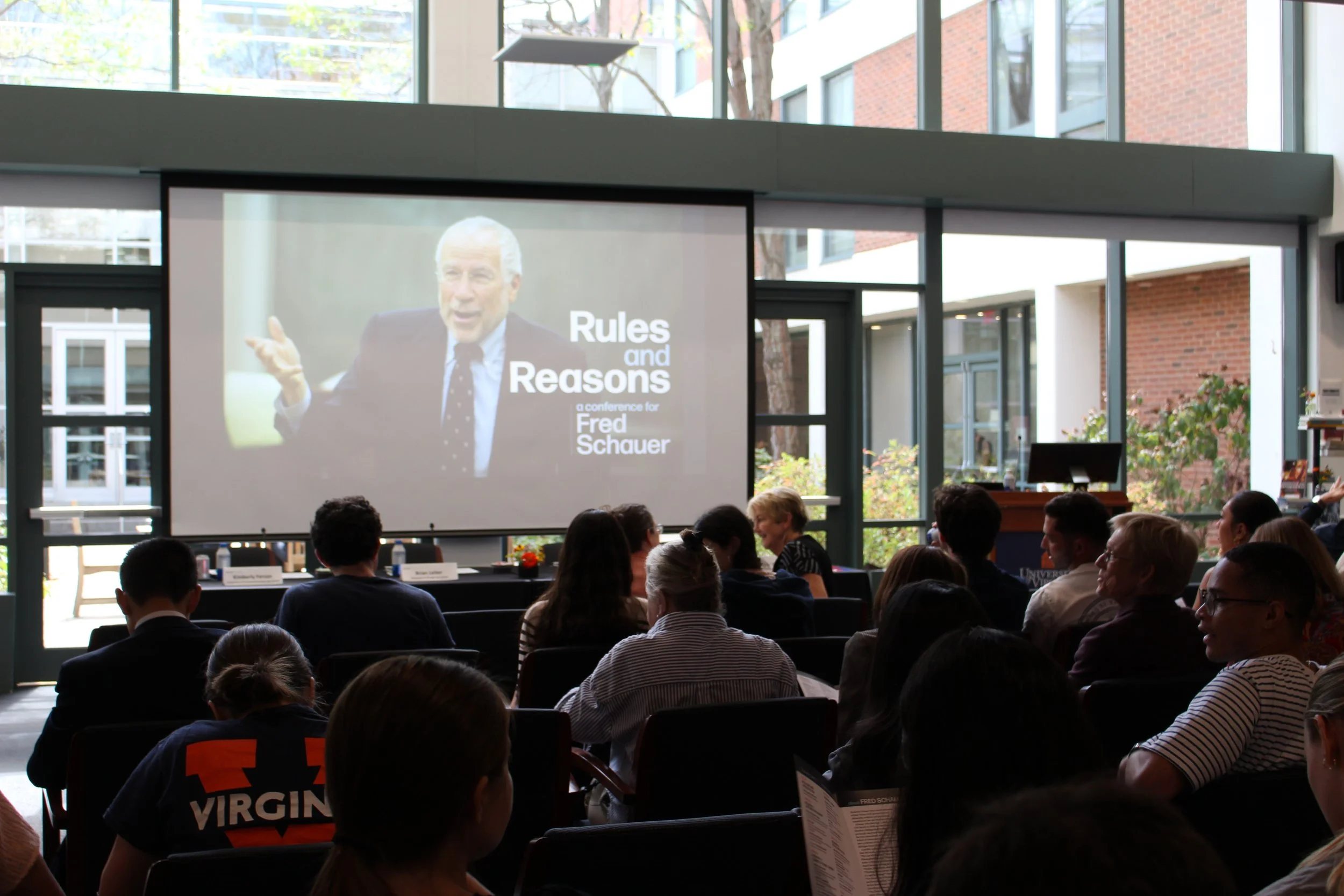Law School Hosts Rules and Reasons: A Conference for Fred Schauer
Source: Jennifer Song
On September 11 and 12, the Law School hosted Rules and Reasons: A Conference for Fred Schauer. The conference celebrated the work of Professor Frederick Schauer, an internationally recognized legal scholar and warmly regarded Law School professor who passed away in September 2024.
Professor Schauer was a prolific author of more than 300 works on constitutional law, free speech, evidence, and legal theory. He was also a first generation high school, college, and professional school graduate. After studying at Dartmouth and Harvard Law School, he practiced briefly as a First Amendment lawyer and then entered legal academia, teaching at several law schools, as well as the Harvard Kennedy School of Government, before coming to UVA in 2008. His works have been translated into eight foreign languages, and he has been ranked among the twenty most cited legal scholars.
The conference began with introductions by Dean Leslie Kendrick ’06 and Professor Barbara Spellman, who works on the intersection of law and psychology and is Professor Schauer’s surviving spouse. They recalled Professor Schauer’s scholarship, “down to earth” personality, and mentorship: Dean Kendrick recalled that he was the “only person I could talk to about ramps [a type of onion]” within academia.
The conference then featured five panels with panelists ranging from American and international legal scholars, judges, and scholars from cognate fields such as philosophy and economics. Thursday began with a panel on Law and Philosophy. University of Chicago Law Professor Brian Leiter critiqued Professor Schauer’s account of American Legal Realism, Penn Carey Law Professor Kimberly Ferzan defended Professor Schauer’s argument that past accusations may in some cases be appropriate evidence in criminal trials, and University of Edinburgh Law Professor Amalia Navarro defended virtue jurisprudence against the charge that it embraces moral particularism, arguing that virtuous judges “play by the rules.” That each panelist engaged critically or extended Professor Schauer’s arguments shows how fruitful his writings continue to be for scholarship.
Thursday continued with a panel on constitutional theory (though heavier on theory than constitutional law). University of San Diego Law Professor Larry Alexander recalled his personal and professional relationship with Professor Schauer and discussed what he saw as an inescapable dilemma between the need for law to improve moral behavior and the fact that the law sometimes punishes people for doing what they think is right. William & Mary Law Professor Allie Larson ’04 spoke about “facty” Supreme Court decisions, arguing that they stem from an unfortunate need to project certainty, and Harvard Law Professor Richard Re, who left UVA last year, argued that “unprincipled” adjudication can sometimes be appropriate.
Friday began with a panel on proof featuring Vanderbilt Law Professor Edward Cheng on deepfakes and trust in evidence, Duke Law Philosopher Walter Sinnott-Armstrong on burden of proof in philosophy, and Justice Alex Stein of the Supreme Court of Israel on the rules of evidence. The next panel covered the nature of rules. Indiana Law Professor Nick Almendares and UVA Law Professor Michael Gilbert used game theory to identify a benefit of standards over rules in contexts of uncertainty. Economists John Allenbach and Richard Zeckhauser of Harvard discussed ways that law shapes the flow of information, and Judge Jed Rakoff praised Professor Schauer’s originality through a discussion of his argument that “bad,” meaning incomplete, science may be good evidence. The panels showed that Professor Schauer was as much an interdisciplinary scholar drawing from cognitive science and economics as he was a jurisprude.
The final panel of the event was on Free Speech. Dartmouth Philosopher Susan Brison discussed Professor Schauer’s philosophical work, and Penn Wharton Professor Amanda Shanor discussed his concept of constitutional salience in the context of current events and the changing politics of free speech. Melbourne Law Professor Adrienne Stone compared free speech law in the United States, Canada, and Australia, presenting reasons for Australia’s more formalist and deferential approach, and Harvard Law Professor Mark Tushnet discussed how free speech law displaces all-things-considered judgements. Skepticism about the United States’s adoration of the First Amendment, a theme of Professor Schauer’s work, was shared across the panel.
The range of topics discussed and expertise of panellists exemplified the breadth of Professor Schauer’s work. Aside from the presentations, however, the conference was also unusually intimate for an academic event. Speakers reflected on Professor Schauer’s character, tics, and hobbies—including woodworking and fine menswear—and recalled his guidance for young scholars and institutional citizenship at the Law School. A table also displayed his travels and gave away books from his and Professor Spellman’s library (many of them translated into Italian, Chinese, and other languages), Twizzlers and other favorite snacks, stuffed animals, and his ties. Clearly, Professor Schauer was as beloved across legal academia as he was within the Law School.

